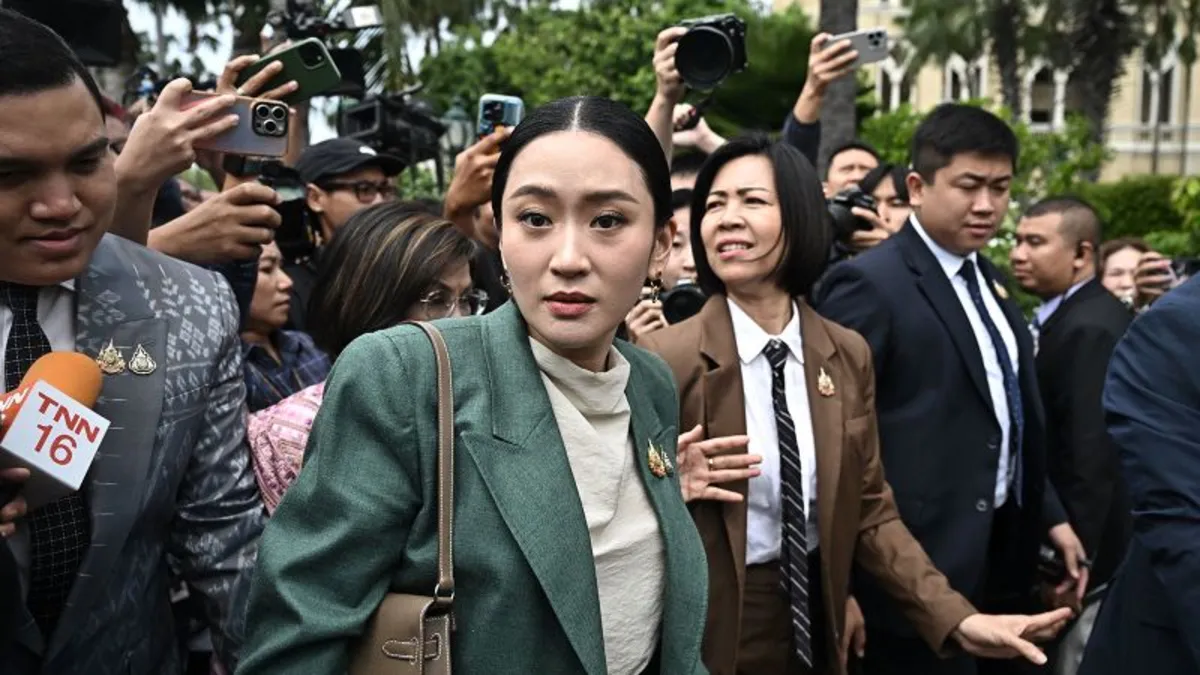
A Thai court has officially removed suspended Prime Minister Paetongtarn Shinawatra from office, a ruling that has plunged the kingdom into a new wave of political turmoil. This decision comes after a controversial phone call between Paetongtarn and former Cambodian leader Hun Sen was deemed to have breached ethical conduct standards. The ruling, which was decided by a 6 to 3 vote, found that Paetongtarn “lacks the qualifications and possesses prohibited characteristics” under the Thai constitution, marking a significant turn in her brief tenure as prime minister.
Paetongtarn, part of the influential Shinawatra political family, became Thailand's youngest prime minister in August 2024, serving only a year in office. The leaked phone call, which took place on June 15 amid escalating border tensions with Cambodia, featured Paetongtarn referring to Hun Sen as “uncle” while criticizing her own army's actions during border clashes that ultimately resulted in the death of a Cambodian soldier. Her statement, “if Hun Sen wants anything, just tell me, and I will take care of it,” has drawn severe backlash and became a focal point of the court case against her.
The Constitutional Court’s findings also emphasized that Paetongtarn “lacked demonstrable honesty and integrity, and seriously violated or failed to comply with ethical standards.” Understandably, her comments have ignited nationalist sentiments in Thailand, where the public was already on edge due to the ongoing border dispute. Following the phone call, the two nations experienced a five-day conflict resulting in at least 38 fatalities, predominantly among civilians, and displacing hundreds of thousands.
In light of the court's decision, Paetongtarn expressed her remorse to the Thai people for any unease caused by her remarks, asserting that her comments were merely a negotiating tactic aimed at easing tensions. During a press conference following the ruling, she thanked the nation and remarked, “This is another time that the court’s decision has created a sudden political change.”
After the court suspended her from her prime ministerial duties on July 1, Paetongtarn continued to serve as culture minister amidst a cabinet reshuffle. This latest ruling highlights the ongoing instability within Thai politics, where attempts for change frequently clash with the entrenched interests of a small group of military, royalist, and business elites.
Over the past two decades, the Thai judiciary has played a pivotal role in shaping the political landscape, having removed numerous lawmakers, dissolved political parties, and overthrown prime ministers through court decisions. In just the last three years, Thailand has seen two prime ministers ousted from power and an election-winning party disbanded. Notably, former army commander Prayut Chan-o-cha ruled as prime minister for nine years following a coup in 2014.
Paetongtarn’s removal reflects a recurring pattern within the Shinawatra family, which has faced numerous political setbacks. Her aunt, Yingluck Shinawatra, was ousted from office before the military coup in 2014, and her father, Thaksin Shinawatra, has been in self-imposed exile for over 15 years due to corruption charges following the military's toppling of his government. Additionally, her uncle Somchai Wongsawat was removed from office by a court ruling in 2008.
The verdict against Paetongtarn poses significant challenges for the future of the powerful Shinawatra family in Thai politics. As the ruling coalition faces internal strife and delays in implementing key policies, the political landscape remains shaky. The leaked phone call has further eroded the party's popularity, forcing the Pheu Thai Party to nominate a new candidate for prime minister, which will require a vote from the 500-seat parliament.
Currently, the only potential candidate is former justice minister Chaikasem Nitisiri, though his ability to secure the necessary support from coalition partners remains uncertain. The resignation of Anutin Charnvirakul, leader of the Bhumjaithai Party, from the coalition further complicates the situation, raising the specter of new elections if the party fails to establish a new prime minister.
As Thailand navigates through this political upheaval, the prospects for the Pheu Thai Party appear precarious. Analysts suggest that the establishment may still prefer a Thaksin-backed party to serve as a buffer against the main opposition, the People’s Party, which has gained significant traction with its reform-oriented agenda. As the situation develops, the implications of Paetongtarn's removal will undoubtedly resonate through the corridors of Thai power for years to come.